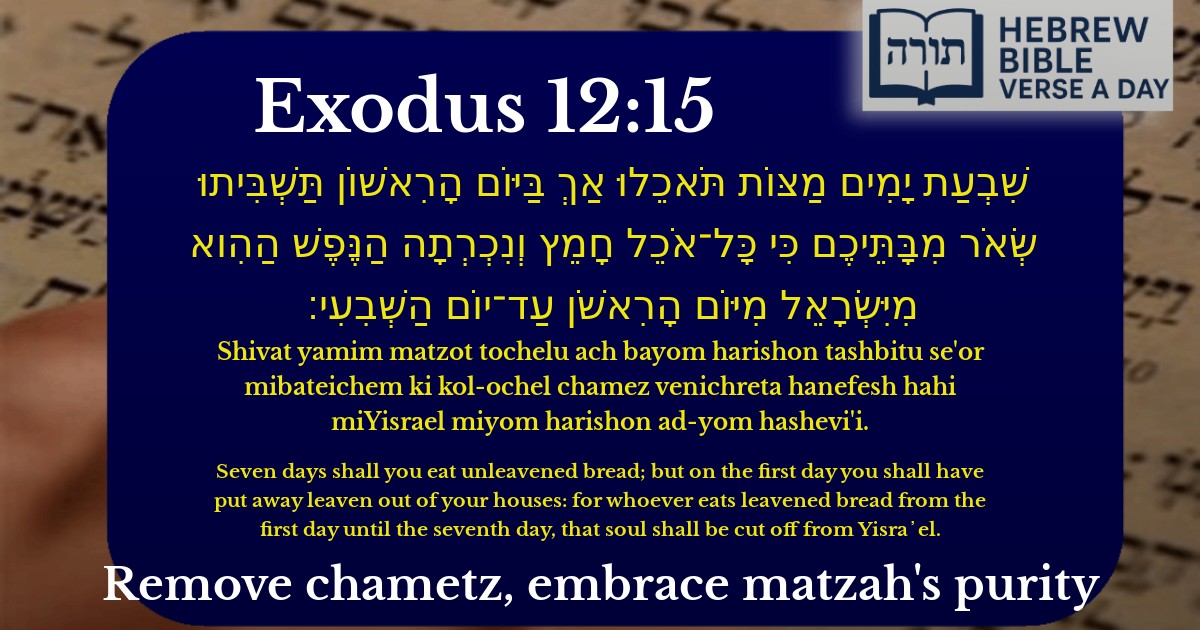Join Our Newsletter To Be Informed When New Videos Are Posted
Join the thousands of fellow Studends who rely on our videos to learn how to read the bible in Hebrew for free!
Hebrew Text
שִׁבְעַת יָמִים מַצּוֹת תֹּאכֵלוּ אַךְ בַּיּוֹם הָרִאשׁוֹן תַּשְׁבִּיתוּ שְּׂאֹר מִבָּתֵּיכֶם כִּי כָּל־אֹכֵל חָמֵץ וְנִכְרְתָה הַנֶּפֶשׁ הַהִוא מִיִּשְׂרָאֵל מִיּוֹם הָרִאשֹׁן עַד־יוֹם הַשְּׁבִעִי׃
English Translation
Seven days shall you eat unleavened bread; but on the first day you shall have put away leaven out of your houses: for whoever eats leavened bread from the first day until the seventh day, that soul shall be cut off from Yisra᾽el.
Transliteration
Shivat yamim matzot tochelu ach bayom harishon tashbitu se'or mibateichem ki kol-ochel chamez venichreta hanefesh hahi miYisrael miyom harishon ad-yom hashevi'i.
Hebrew Leining Text
שִׁבְעַ֤ת יָמִים֙ מַצּ֣וֹת תֹּאכֵ֔לוּ אַ֚ךְ בַּיּ֣וֹם הָרִאשׁ֔וֹן תַּשְׁבִּ֥יתוּ שְּׂאֹ֖ר מִבָּתֵּיכֶ֑ם כִּ֣י&thinsp
שִׁבְעַ֤ת יָמִים֙ מַצּ֣וֹת תֹּאכֵ֔לוּ אַ֚ךְ בַּיּ֣וֹם הָרִאשׁ֔וֹן תַּשְׁבִּ֥יתוּ שְּׂאֹ֖ר מִבָּתֵּיכֶ֑ם כִּ֣י&thinsp
🎵 Listen to leining
Parasha Commentary
📚 Talmud Citations
This verse is quoted in the Talmud.
📖 Pesachim 5a
The verse is discussed in the context of the prohibition of chametz (leaven) during Passover and the requirement to remove it from one's home.
📖 Pesachim 28b
The verse is referenced in a discussion about the timing for the removal of chametz and the severity of the prohibition.
📖 Makkot 13b
The verse is cited in a discussion about the punishment of being 'cut off' (karet) for eating chametz during Passover.


Obligation to Eat Matzah and Prohibition of Chametz
The verse (Shemot 12:15) establishes two key mitzvot of Pesach: the positive commandment to eat matzah for seven days and the prohibition against owning or consuming chametz (leavened bread) during that time. The Torah emphasizes the severity of this prohibition by stating that one who eats chametz during Pesach will be karet (cut off) from Israel.
Rashi's Explanation of "On the First Day"
Rashi clarifies that "the first day" refers to the 14th of Nisan, the day before Pesach begins at nightfall. He explains that the removal of chametz (bitul chametz) must be completed by midday (chatzot) on the 14th, as derived from the Talmud (Pesachim 5a). This is based on the understanding that "the first day" in this context means the day before the festival begins.
The Severity of the Chametz Prohibition
The Rambam (Hilchot Chametz U'Matzah 1:2) emphasizes the unique severity of eating chametz on Pesach, noting that it carries the punishment of karet, unlike most other Torah prohibitions which typically involve lashes. The Talmud (Pesachim 28b) explains that this severity stems from chametz symbolizing arrogance and the yetzer hara (evil inclination), which we must completely remove during this holy time.
Spiritual Dimensions from Chassidic Thought
The Baal HaTanya (Likutei Torah) explains that the seven days of eating matzah correspond to the seven emotional attributes (middot) that we must refine. Chametz represents ego and pride, while matzah - simple, humble bread - symbolizes submission to Hashem's will. The requirement to remove chametz "from your houses" also alludes to removing arrogance from our hearts.
Practical Halachic Implications